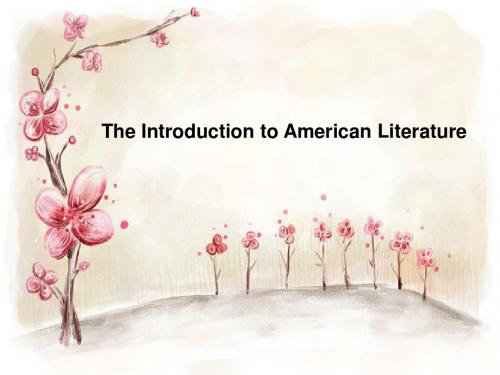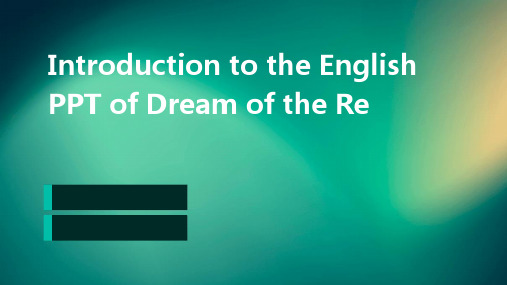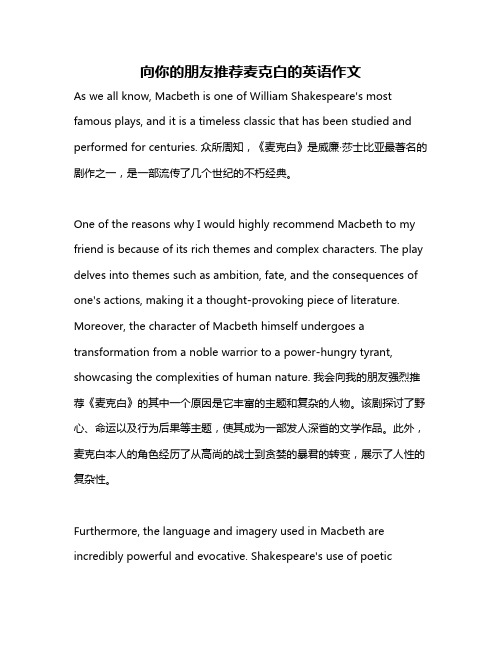An Introduction to Macbeth
麦克白介绍PPT

END
•thank You
Brief Introduction
• Macbeth (full title The Tragedy of Macbeth) is a tragedy written by William Shakespeare, and is considered one of his darkest and most powerful works. Set in Scotland, the play dramatizes the corrosive psychological and political effects produced when evil is chosen as a way to fulfil the ambition for power.
Summarize
• The great writer Maxim Gorky once said: "the book is the ladder of human progress." indeed reading can cultivate sentiments, reading can broaden our horizons, the book from the ocean for drip sentiment, hone their own, improve oneself, one of Shakespeare's four tragedies" • The tragedy reflects the personal ambition infinite development inevitable result, the social attributes of the decision. In between man and nature, people are afraid of the mystery of nature and immense power, only to follow nature 's mercy, to jump out the na
the introduction to american literature

2. The Very Brief Outline of American Literature 1. Colonial period (1607-1783) 2. Romanticism (1783-1861) 3. Realism (1861-1914) 4. Modernism (1914-1945) 5. Contemporary Literature (1945-now) 3. Conclusion: Although derived mainly from British literary academy, American literature has gradually formed its own characteristic style. It’s because her uniqueness that American literary thumbs has gained such an achievement that from 1930, starting with Sinclair Lewis, there has been eleven authors who have been awarded with Nobel Literary Prize.
Anne Bradstreet
Benjamin Franklin
Jonathan Edwards
2. Romanticism Time The Independence War The Civil War
1783 1861
American ideal of democracy & equality, industrialization, westward expansion, foreign influences
红楼梦 英文PPT介绍

The new employees a multi perspective narrative technique with different characters advancing their unique perspectives on events This allows readers to gain a deeper understanding of the characters and their motivations, and enhances the overall complexity and wealth of the story
explored in Dream of the Red Chamber
Influence of works
Literary Value
Considered a masterpiece in Chinese literature, it has influenced countless writers and works since its publication
complexity of both the Jia and Lin families
Wang Xifeng
Character Overview
Wang Xifeng is a supporting character in Dream of the Red Chamber and is considered one of the most important female characters in Chinese literature She is a strong willed and cunning woman who plays a pivotal role in the story
麦克白赏析PPT英文版

论麦克白中的敲门声

ON THE KNOCKING AT THE GATE IN'MACBETH'by Thomas De QuinceyFROM my boyish days I had always felt a great perplexity on one point in Macbeth. It was this: the knocking at the gate, which succeeds to the murder of Duncan, produced to my feelings an effect for which I never could account. The effect was, that it reflected back upon the murderer a peculiar awfulness and a depth of solemnity; yet, however obstinately I endeavoured with my understanding to comprehend this, for many years I never could see why it should produce such an effect.Here I pause for one moment, to exhort the reader never to pay any attention to his understanding, when it stands in opposition to any other faculty of his mind. The mere understanding, however useful and indispensable, is the meanest faculty in the human mind, and the most to be distrusted; and yet the great majority of people trust to nothing else, which may do for ordinary life, but not for philosophical purposes. Of this out of ten thousand instances that I might produce, I will cite one. Ask of any person whatsoever, who is not previously prepared for the demand by a knowledge of the perspective, to draw in the rudest way the commonest appearance which depends upon the laws of that science; as, for instance, to represent the effect of two walls standing at right angles to each other, or the appearance of the houses on each side of a street, as seen by a person looking down the street from one extremity. Now in all cases, unless the person has happened to observe in pictures how it is that artists produce these effects, he will be utterly unable to make the smallest approximation to it. Yet why? For he has actually seen the effect every day of his life. The reason is- that he allows his understanding to overrule his eyes. His understanding, which includes no intuitive knowledge of the laws of vision, can furnish him with no reason why a line which is known and can be proved to be a horizontal line, should not appear a horizontal line; a line that made any angle with the perpendicular, less than a right angle, would seem to him to indicate that his houses were all tumbling down together. Accordingly, he makes the line of hishouses a horizontal line, and fails, of course, to produce the effect demanded. Here, then, is one instance out of many, in which not only the understanding is allowed to overrule the eyes, but where the understanding is positively allowed to obliterate the eyes, as it were; for not only does the man believe the evidence of his understanding in opposition to that of his eyes, but (what is monstrous!) the idiot is not aware that his eyes ever gave such evidence. He does not know that he has seen (and therefore quoad his consciousness has not seen) that which he has seen every day of his life.But to return from this digression, my understanding could furnish no reason why the knocking at the gate in Macbeth should produce any effect, direct or reflected. In fact, my understanding said positively that it could not produce any effect. But I knew better; I felt that it did; and I waited and clung to the problem until further knowledge should enable me to solve it. At length, in 1812, Mr. Williams made his debut on the stage of Ratcliffe Highway, and executed those unparalleled murders which have procured for him such a brilliant and undying reputation. On which murders, by the way, I must observe, that in one respect they have had an ill effect, by making the connoisseur in murder very fastidious in his taste, and dissatisfied by anything that has been since done in that line. All other murders look pale by the deep crimson of his; and, as an amateur once said to me in a querulous tone, 'There has been absolutely nothing doing since his time, or nothing that's worth speaking of.' But this is wrong; for it is unreasonable to expect all men to be great artists, and born with the genius of Mr. Williams. Now it will be remembered, that in the first of these murders (that of the Marrs), the same incident (of a knocking at the door) soon after the work of extermination was complete, did actually occur, which the genius of Shakespeare has invented; and all good judges, and the most eminent dilettanti, acknowledged the felicity of Shakespeare's suggestion, as soon as it was actually realized. Here, then, was a fresh proof that I was right in relying on my own feeling, in opposition to my understanding; and I again set myself to study the problem; at length I solved it to my own satisfaction, and my solution is this. Murder, in ordinary cases, where the sympathy is wholly directed to the case of the murdered person, is an incident of coarse and vulgar horror; and for this reason, that it flings the interest exclusively upon the natural but ignoble instinct by whichwe cleave to life; an instinct which, as being indispensable to the primal law of self-preservation, is the same in kind (though different in degree) amongst all living creatures: this instinct, therefore, because it annihilates all distinctions, and degrades the greatest of men to the level of 'the poor beetle that we tread on', exhibits human nature in its most abject and humiliating attitude. Such an attitude would little suit the purposes of the poet. What then must he do? He must throw the interest on the murderer. Our sympathy must be with him (of course I mean a sympathy of comprehension, a sympathy by which we enter into his feelings, and are made to understand them,- not a sympathy of pity or approbation *002 ). In the murdered person, all strife of thought, all flux and reflux of passion and of purpose, are crushed by one overwhelming panic; the fear of instant death smites him 'with its petrific mace'. But in the murderer, such a murderer as a poet will condescend to, there must be raging some great storm of passion- jealousy, ambition, vengeance, hatred- which will create a hell within him; and into this hell we are to look.In Macbeth, for the sake of gratifying his own enormous and teeming faculty of creation, Shakspere has introduced two murderers: and, as usual in his hands, they are remarkably discriminated: but, though in Macbeth the strife of mind is greater than in his wife, the tiger spirit not so awake, and his feelings caught chiefly by contagion from her,- yet, as both were finally involved in the guilt of murder, the murderous mind of necessity is finally to be presumedin both. This was to be expressed; and on its own account, as well as to make it a more proportionable antagonist to the unoffending nature of their victim, 'the gracious Duncan,' and adequately to expound 'the deep damnation of his taking off', this was to be expressed with peculiar energy. We were to be made to feel that the human nature, i.e. the divine nature of love and mercy, spread through the hearts of all creatures, and seldom utterly withdrawn from man- was gone, vanished, extinct, and that the fiendish nature had taken its place. And, as this effect is marvellously accomplished in the dialogues and soliloquies themselves, so it is finally consummated by the expedient under consideration; and it is to this that I now solicit the reader's attention. If the reader has ever witnessed a wife, daughter, or sister in a fainting fit, he may chance to have observed that the most affectingmoment in such a spectacle is that in which a sigh and a stirring announce the recommencement of suspended life. Or, if the reader has ever been present in a vast metropolis, on the day when some great national idol was carried in funeral pomp to his grave, and chancing to walk near the course through which it passed, has felt powerfully in the silence and desertion of the streets, and in the stagnation of ordinary business, the deep interest which at that moment was possessing the heart of man- if all at once he should hear the death-like stillness broken up by the sound of wheels rattling away from the scene, and making known that the transitory vision was dissolved, he will be aware that at no moment was his sense of the complete suspension and pause in ordinary human concerns so full and affecting, as at that moment when the suspension ceases, and the goings-on of human life are suddenly resumed. All action in any direction is best expounded, measured, and made apprehensible, by reaction. Now apply this to the case in Macbeth. Here, as I have said, the retiring of the human heart, and the entrance of the fiendish heart was to be expressed and made sensible. Another world has stept in; and the murderers are taken out of the region of human things, human purposes, human desires. They are transfigured: Lady Macbeth is 'unsexed;' Macbeth has forgot that he was born of woman; both are conformed to the image of devils; and the world of devils is suddenly revealed. But how shall this be conveyed and made palpable? In order that a new world may step in, this world must for a time disappear. The murderers, and the murder must be insulated- cut off by an immeasurable gulf from the ordinary tide and succession of human affairs- locked up and sequestered in some deep recess; we must be made sensible that the world of ordinary life is suddenly arrested- laid asleep- tranced- racked into a dread armistice; time must be annihilated; relation to things without abolished; and all must pass self-withdrawn into a deep syncope and suspension of earthly passion. Hence it is, that when the deed is done, when the work of darkness is perfect, then the world of darkness passes away like a pageantry in the clouds: the knocking at the gate is heard; and it makes known audibly that the reaction has commenced; the human has made its reflux upon the fiendish; the pulses of life are beginning to beat again; and the re-establishment of the goings-on of the world in which we live, first makes us profoundly sensible of the awful parenthesis that had suspended them.O mighty poet! Thy works are not as those of other men, simply and merely great works of art; but are also like the phenomena of nature, like the sun and the sea, the stars and the flowers; like frost and snow, rain and dew, hail-storm and thunder, which are to be studied with entire submission of our own faculties, and in the perfect faith that in them there can be no too much or too little, nothing useless or inert- but that, the farther we press in our discoveries, the more we shall see proofs of design and self-supporting arrangement where the careless eye had seen nothing but accident!Footnotes*1 First published in The London Magazine, October 1823.*2 It seems almost ludicrous to guard and explain my use of aword, in a situation where it would naturally explain itself. But it has become necessary to do so, in consequence of the unscholarlike use of the word sympathy, at present so general, by which, instead of taking it in its proper sense, as the act of reproducing in our minds the feelings of another, whether for hatred, indignation, love, pity,or approbation, it is made a mere synonyme of the word pity; andhence, instead of saying 'sympathy with another, many writers adoptthe monstrous barbarism of 'sympathy for another.。
向你的朋友推荐麦克白的英语作文

向你的朋友推荐麦克白的英语作文As we all know, Macbeth is one of William Shakespeare's most famous plays, and it is a timeless classic that has been studied and performed for centuries. 众所周知,《麦克白》是威廉·莎士比亚最著名的剧作之一,是一部流传了几个世纪的不朽经典。
One of the reasons why I would highly recommend Macbeth to my friend is because of its rich themes and complex characters. The play delves into themes such as ambition, fate, and the consequences of one's actions, making it a thought-provoking piece of literature. Moreover, the character of Macbeth himself undergoes a transformation from a noble warrior to a power-hungry tyrant, showcasing the complexities of human nature. 我会向我的朋友强烈推荐《麦克白》的其中一个原因是它丰富的主题和复杂的人物。
该剧探讨了野心、命运以及行为后果等主题,使其成为一部发人深省的文学作品。
此外,麦克白本人的角色经历了从高尚的战士到贪婪的暴君的转变,展示了人性的复杂性。
Furthermore, the language and imagery used in Macbeth are incredibly powerful and evocative. Shakespeare's use of poeticlanguage and vivid imagery adds depth and emotion to the play, immersing the audience in the world of the characters. From the famous soliloquies to the supernatural elements woven throughout the plot, Macbeth is a masterclass in storytelling and language. 此外,《麦克白》中使用的语言和意象力量极为强大且富有感染力。
麦克白介绍PPT

Characters
• •
•
Duncan – King of Scotland Malcolm – Duncan's elder son Donalbain – Duncan's younger son
Macbeth – a general in the army of King Duncan; originally Thane of Glamis, then Thane of Cawdor, and later King of Scotland Lady Macbeth – Macbeth's wife, and later Queen of Scotland Banquo – Macbeth's friend and a general in the army of King Duncan Fleance – Banquo's son Macduff – Thane of Fife Lady Macduff – Macduff's wife Macduff's son Ross, Lennox, Angus, Menteith, Caithness – Scottish Thanes Siward – general of the English forces Young Siward – Siward'su
全文阅读已结束如果下载本文需要使用
Brief Introduction
• Macbeth (full title The Tragedy of Macbeth) is a tragedy written by William Shakespeare, and is considered one of his darkest and most powerful works. Set in Scotland, the play dramatizes the corrosive psychological and political effects produced when evil is chosen as a way to fulfil the ambition for power.
麦克白

Main Characters
• Duncan – King of Scotland
– Malcolm – Duncan's elder son Donalbain – Duncan's younger son
• Macbeth – a general in the army of King Duncan; originally Thane of Glamis, then Thane (领主)of Cawdor, and later King of Scotland
IV. While the two men wonder at these pronouncements, the witches vanish, and another thane, Ross, arrives and informs Macbeth of his newly bestowed title: Thane of Cawdor. The first prophecy is thus fulfilled, and Macbeth immediately begins to harbour ambitions of becoming king.
- 1、下载文档前请自行甄别文档内容的完整性,平台不提供额外的编辑、内容补充、找答案等附加服务。
- 2、"仅部分预览"的文档,不可在线预览部分如存在完整性等问题,可反馈申请退款(可完整预览的文档不适用该条件!)。
- 3、如文档侵犯您的权益,请联系客服反馈,我们会尽快为您处理(人工客服工作时间:9:00-18:30)。
A BRIEF INTRODUCTION TO SHAKESPEARE AND MACBETH
Important Events of the 16th Century
In 1588, the English fleet benefited from unusually helpful weather conditions to defeat the Spanish “Grande Armada.”
Important Events (Cont.)
The Death of Queen Elizabeth I (1603). Elizabeth I was succeeded by the
Scottish King James the VI (and I).
Segue to Shakespeare (15641616)
Important Events of the 16th Century
The Witchcraft Hysteria (1480s-1630s)
Throughout Europe, suddenly hunts for witches began to appear all over the place.
John Milton “On Shakespeare”
“WHAT needs my Shakespeare, for his honoured bones, The labour of an age in pilèd stones? Or that his hollowed relics should be hid Under a stary-pointing pyramid? Dear son of Memory, great heir of Fame, What need’st thou such weak witness of thy name? “
Iambic Pentameter (foot-stressed five rhythm)
The idea of “stressed” and “unstressed” syllables– trapeze (tra-PEZE).
If mu- / -sic be / the food / of love, / play on.
Is this / a dag- / -ger I / see be- / fore me?
The early 1600s
During the Early 1600s, Shakespeare is
generally held to have written and performed his four best tragedies. Hamlet, Macbeth, Othello, and King Lear.
The Malleus
Maleficorum
Some Characteristics of Renaissance Witches
Not quite like Hogwarts… Supposed to meet
regularly with the devil at ceremonies called “sabbats” Have “familiars,” or spirits that look like animals. Can only perform “magic,” as opposed to “miracles.”
The Globe (1599-Present)
…Something about Shakespeare…
The use of Blank Verse: “from jigging veins of
rhyming mother wit.”
A bit about Iambic
Pentameter.
The Legend of Shakespeare
In the First Folio, Ben Johnson claims that Shakespeare never changed a line after he wrote it. He also wrote that S.
had “little Latin and less Greek,” but was nonetheless, “not for an age, but for all time.”
